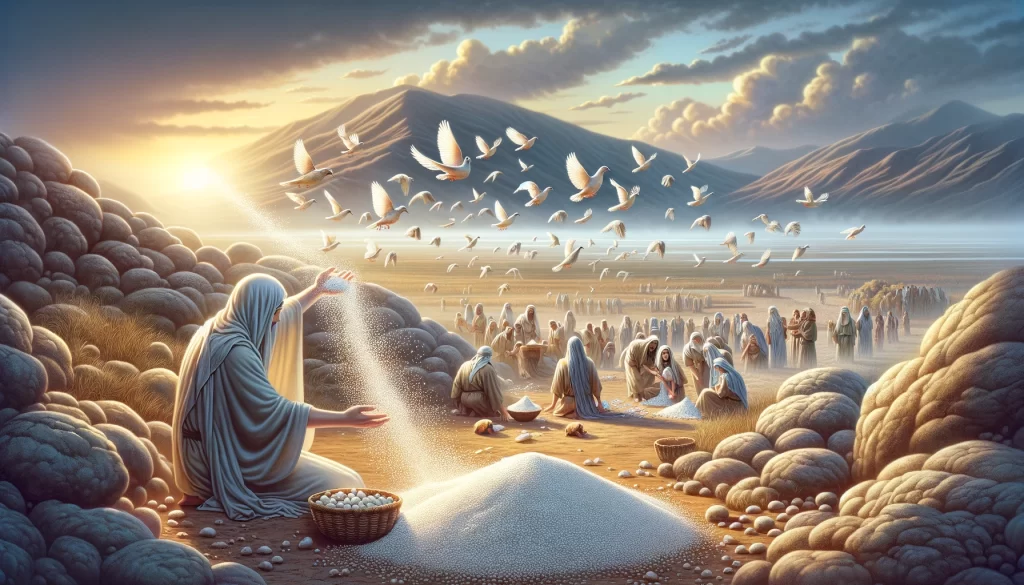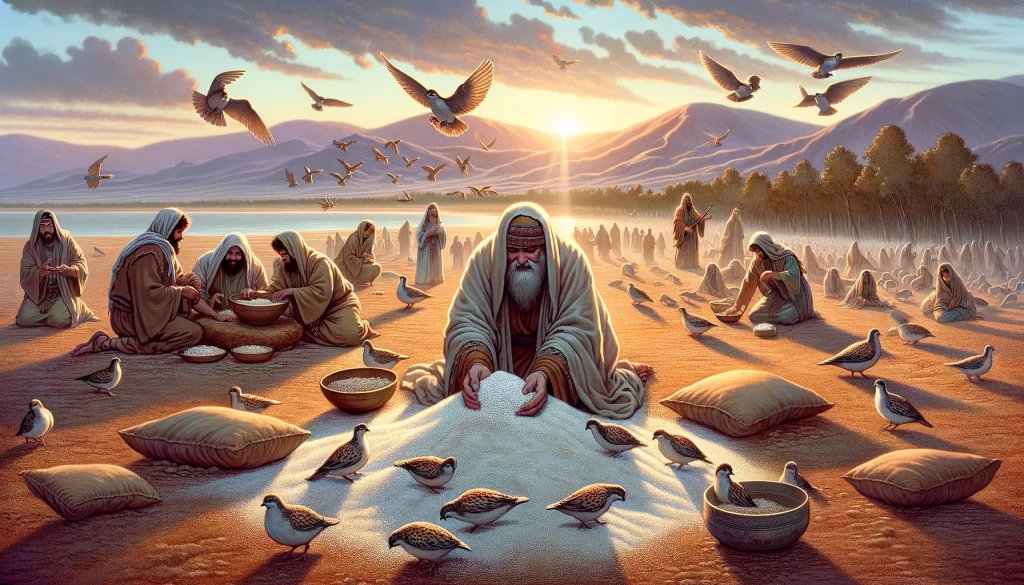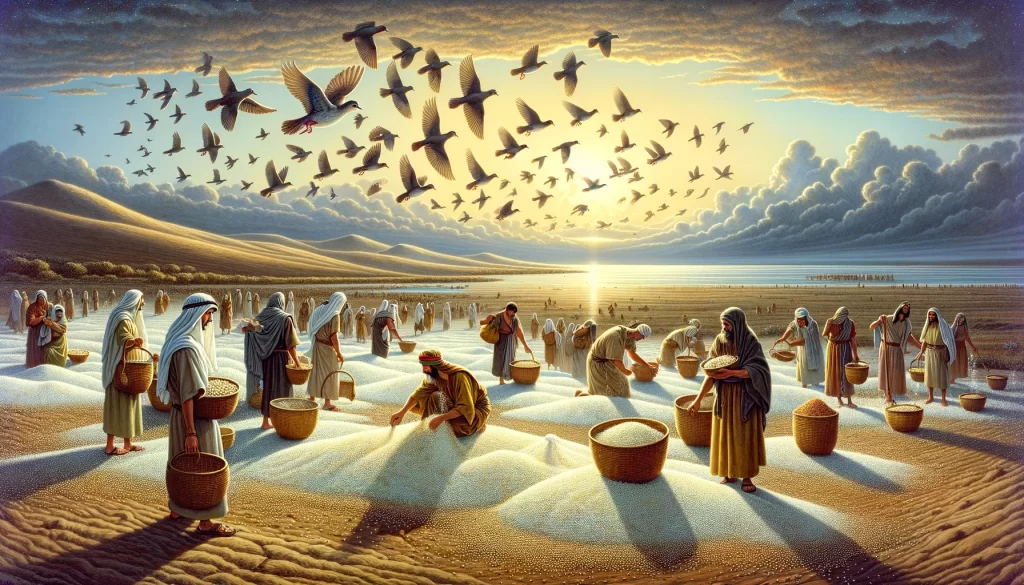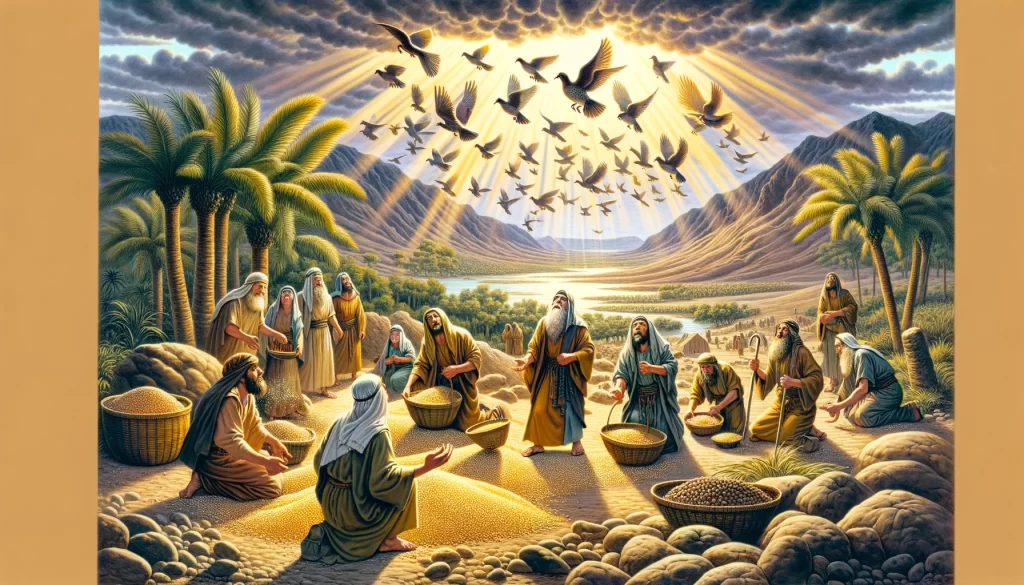In the midst of a barren wilderness, a divine intervention took place, leaving the Israelites in awe of the miracles that unfolded before their eyes. This is the story of manna and quail, a tale rooted in wonder and the power of faith.
Imagine a desert landscape, where sustenance seemed impossible to find. Yet, in their time of greatest need, the heavens showered the Israelites with manna, a mysterious food that appeared like dew each morning. And when their appetite for variety grew, flocks of quail descended, providing a delectable feast.

The biblical account of manna and quail holds immense significance, symbolizing the divine provision and care bestowed upon a chosen people. It serves as a testament to the enduring power of belief in times of scarcity and uncertainty.
Join us as we unravel the miraculous story of manna and quail, exploring its historical, spiritual, and metaphoric dimensions. Discover the lessons it imparts, the mysteries that surround it, and the profound impact it continues to have on our collective understanding of faith and sustenance.
Biblical Account of Manna and Quail
The story of manna and quail can be found in the book of Exodus in the Bible. According to the biblical account, the Israelites, led by Moses, had escaped from slavery in Egypt and were journeying through the wilderness towards the Promised Land. However, the harsh conditions of the desert presented them with a new challenge – finding food to sustain themselves. In their despair, they cried out to God, and in response, He provided them with manna. This miracle food appeared each morning, covering the ground like dew. The Israelites were instructed to gather it, and it sustained them throughout their time in the wilderness. Additionally, when the people grew tired of eating manna alone, God sent an abundance of quail, providing them with a diverse and satisfying feast. This divine intervention was a clear demonstration of God’s love and care for His chosen people.

The story of manna and quail is not just a historical account but also a powerful metaphor for the human journey. It symbolizes the trials and tribulations we face in life and the unwavering faith required to overcome them. The Israelites’ reliance on God’s provision represents the need for trust and dependence on a higher power, even when circumstances seem dire. The manna and quail were not just physical sustenance but also spiritual nourishment, reminding the Israelites of their connection to the divine and the importance of their faith.
Symbolism and Significance of Manna and Quail
The symbolism and significance of manna and quail extend far beyond their historical context. These miraculous provisions represent the faithfulness of God and His ability to provide for His people even in the most challenging circumstances. The manna, appearing like dew each morning, symbolizes the freshness and newness of God’s provision. It was a reminder to the Israelites that God’s mercies are new every day, and they could trust Him to meet their needs. The quail, on the other hand, represents abundance and variety. It shows that God not only provides the essentials but also delights in giving His people more than they could ask or imagine.

Moreover, the manna and quail serve as a testament to the divine presence and guidance throughout the Israelites’ journey. The manna appeared only in the morning, reinforcing the idea that God’s provision comes at the appointed time. It required the Israelites to trust in God’s timing and not hoard or rely solely on their own efforts. The quail, on the other hand, appeared in response to the people’s desires for more variety in their diet. It showed that God not only meets our basic needs but also cares about our desires and delights in providing for them. The story of manna and quail teaches us that God’s provision is not limited to the physical realm but extends to our emotional, mental, and spiritual well-being as well.
Historical and Scientific Explanations of Manna and Quail
While the story of manna and quail is often regarded as a miraculous event, historians and scientists have proposed various explanations to understand these phenomena from a more rational perspective. Some theories suggest that the manna mentioned in the Bible could be a natural substance called “manna gum resin” produced by certain trees in the Middle East. This resin has a sweet taste and was used as a natural sweetener in ancient times. It is possible that the Israelites encountered this resin during their journey and saw it as a miraculous provision from God.

As for the quail, migratory patterns of birds provide a scientific explanation for their sudden appearance in the wilderness. It is known that quails migrate in large numbers during certain seasons, and their flight paths often traverse the region where the Israelites were wandering. It is possible that a convergence of factors, including weather conditions and the timing of the Israelites’ journey, led to a large influx of quail in the area. This natural phenomenon could have been interpreted as a divine intervention by the Israelites, reinforcing their belief in God’s providence.
While these scientific explanations offer plausible theories, they do not diminish the significance or spiritual impact of the story of manna and quail. Whether seen as purely miraculous or as a convergence of natural factors, the story continues to inspire faith and hope in the face of adversity.
Similarities between manna and quail and other religious texts or traditions
Throughout history, various religious texts and traditions have highlighted the significance of divine provision and sustenance. The story of manna and quail in the Bible shares remarkable similarities with other narratives across different faiths.
One such parallel can be found in Hindu mythology, where the gods provided Amrita, a divine nectar, to sustain the gods and goddesses during their battle with the demons. This elixir is said to have bestowed immortality upon those who consumed it, reflecting the idea of divine sustenance and eternal life.
In Norse mythology, the gods used a magical goat named Heidrun to provide an endless supply of mead, a drink associated with wisdom and inspiration. This tale echoes the concept of divine provision, where the gods ensure the well-being of their followers through a miraculous source of nourishment.
Similarly, in Islamic tradition, the story of the Prophet Muhammad’s journey to the heavens, known as the Isra and Mi’raj, includes a celestial feast where the Prophet and his followers are served food and drink by angels. This feast symbolizes divine sustenance and the blessings bestowed upon the believers.
These parallels highlight the universal human desire for divine nourishment and the belief in a higher power that provides for its followers. The story of manna and quail, with its themes of miraculous provision, resonates across different cultures and religions, underscoring the timeless importance of faith and sustenance.